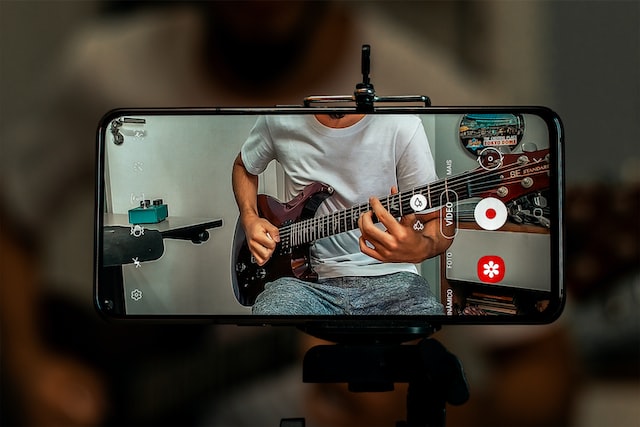Monetize Your Website as a Music Professional. As a music professional, monetizing your website is not just an option — it’s a necessity. With the right strategies, you can turn your passion into a sustainable income stream.

- Introduction to Website Monetization for Musicians
- Google AdSense: Earning Through Advertisements
- Affiliate Marketing: Promoting Products for Commission
- Selling Music and Merchandise Online
- Private Coaching and Workshops: Share Your Expertise
- Subscription Services: Building a Loyal Fanbase
- Sponsorship: get sponsors for programs or sections
- Sell your book or learning method
- Licensing Your Music: Earn from Your Creations
- Offering Online Courses: Monetizing Your Skills
- Membership or referral programs
- Sponsorships and Partnerships: Collaborating for Profit
- Online workshop: your web!
- Support from brands, venues or other channels.
- Review of products of infoproducts
- Maximizing Social Media: Drive Traffic and Sales
- Crowdfunding and Donations: Engage with Your Audience
- Monetize Your Website as a Music Professional (DIY)
Introduction to Website Monetization for Musicians
Monetizing a website is crucial for independent musicians who often struggle to make a living solely from their music. The journey can be challenging, but with the right tools and strategies, your website can become a significant source of income.
As an opera singer turned digital marketer, I’ve experienced this firsthand and have helped many musicians achieve their financial goals online. Let’s dive into the most effective methods to monetize your website.
Google AdSense: Earning Through Advertisements
One of the simplest ways to start earning money from your website is through Google AdSense. This program allows you to display ads on your site, and you earn revenue whenever visitors click on these ads. It’s a form of passive income that can grow as your traffic increases.
In my own experience, AdSense has provided a steady stream of income. Initially, the earnings might seem modest, but they can surprise you, especially if your content starts trending or gains more traction. It’s a low-effort, high-reward strategy that every musician with a website should consider.
For some reason Google shows musicians in its ads program pages… See some inspiring success stories of Google Adds for business like yours.
However, due to the number of poorly made sites, with poor designs, confusing navigation, and texts with little or no contribution (poorly written, repetition of ideas, copies from others, etc.), Google has become much more demanding.
Al final, el enlace al sitio de Google Adsense, y un par de recomendaciones para sacarle máximo provecho a esta fuente de ingresos.
Affiliate Marketing: Promoting Products for Commission
Affiliate marketing is another excellent way to generate income. By partnering with companies like Amazon, you can promote products relevant to your audience and earn a commission on every sale made through your referral links.
This strategy works particularly well if you have a blog or a section on your site where you can review and recommend gear, instruments, or music-related services.
For instance, I’ve used Amazon’s affiliate program on my websites, and it has proven to be a valuable income source. Every time someone purchases a product I’ve recommended, I receive a small commission, which adds up over time.
It may be the second best option to generate income, but always after you have been accepted in Google Adsense, otherwise they will not accept you in the first one.
As a music professional, with Amazon access, you can promote everything from musical instruments, methods, equipment, clothing, and accessories; and you will receive between 3% (Electronics and IT) and 20% (Amazon Games) from each sale.
If you already have your website and want to implement these programs, you can do so with tutorials on YouTube, or write to me for free advice.
At the bottom of this article you will find more details about the Amazon affiliate program and its list of commissions. So far you have two good sources of income, but there are more. Keep reading…
Start monetizing your website!
Pick a way to monetize, implement it, then another, implement it, and get to work to make the money come in!
Selling Music and Merchandise Online
Direct sales of your music and merchandise can be a significant revenue stream. Platforms like Bandcamp or setting up an e-commerce store through Shopify make it easy to sell physical and digital products directly to your fans. You can sell anything from albums and singles to T-shirts and posters.
Shopify, in particular, offers a comprehensive solution for musicians. You can create a fully customizable online store to sell your music and merchandise, manage orders, and even handle shipping. This not only helps you earn more but also strengthens your brand by offering fans exclusive products.
Private Coaching and Workshops: Share Your Expertise
Another effective way to monetize your website is by offering private coaching or group workshops. Whether you specialize in vocal training, instrument lessons, or even digital marketing for musicians, there’s always someone willing to pay for your expertise.
I’ve personally benefited from offering coaching services through my website. These sessions, which focus on personal branding and online presence for musicians, have become a substantial part of my income. It’s incredibly rewarding to help fellow musicians while also earning money from it.
Subscription Services: Building a Loyal Fanbase
Subscription models, such as Patreon, allow your most dedicated fans to support you regularly. In exchange, you can offer them exclusive content, early access to new music, or behind-the-scenes insights. This creates a steady income stream while deepening your connection with your audience.
Platforms like Patreon have revolutionized how artists can monetize their work. By offering tiers of content or experiences, you can cater to different levels of support, making it accessible to a wide range of fans.
Sponsorship: get sponsors for programs or sections
If you are a professional musician with a good track record, another way to monetize a musician’s website is by offering sponsored spots or programs.
If you are just starting out or don’t have enough authority yet, it will be difficult to get sponsorship, but if you already enjoy a certain amount of fame through awards, media presence, or playing with celebrities, you can use your site to promote stores or brands.
I know musicians who receive a considerable amount of income from well-known brands of musical equipment or instruments, just by mentioning them on their website or videos.
Abel Franco is an extraordinary guitarist and friend, who has received sponsorship from guitar brands, pedals, microphones, amplifiers, studios and magazines from several countries.
Sell your book or learning method
If your training program has enough theoretical content, you have your own method or you would like to design a good downloadable guide, then there is another source of income for you.
You will have what in marketing we call an infoproduct, ebook, guide, digital content that you can offer in digital format for download after the respective payment.
You can gain subscribers by giving away a simple guide, such as “10 Ukulele Songs for Beginners” or “First Steps to Playing Electric Guitar.” To download the guide, you will be given an email that you can follow up on until you win your student, or they recommend you to someone else who wants to learn from you.
You can also upload your complete teaching method or program, and offer it with access to your site or for download once they have confirmed the purchase.
You just need to organize the content and a good presentation
Licensing Your Music: Earn from Your Creations
Licensing your music for use in films, commercials, or video games can be incredibly lucrative. By making your tracks available on licensing platforms, you open up new revenue streams that can significantly boost your income.
For musicians, licensing can often be a hidden gem. Once your music is out there, it can continue earning money for years to come, providing a long-term income source.
Offering Online Courses: Monetizing Your Skills
If you have specialized knowledge, consider creating online courses. This could be anything from music theory to production techniques. Websites like Teachable or Udemy make it easy to create and sell courses directly from your website.
This approach is particularly effective for those who want to share their knowledge with a broader audience. Online courses can be a lucrative way to leverage your expertise, especially if you build a strong reputation in your niche.
Here your students will see you and benefit from your actions. You can give private or group classes. You can teach one person for 30-50€ an hour, or several people for 10€ in the same hour.
The group is more attractive financially because you can take care of 10 students who pay only 10€, and you will have 100€ in one hour. But you will also have more work.
Private classes leave you with less money per hour, but there are students who are worth it, because of their personality, their level (which will also make you learn), or because they can bring you other students, a good review or a key contact.
This is the most demanding source, because it not only involves having all the content of the course described on your page, but ready to deliver with the first purchase.
Start with an introductory course (so you can sell other levels later). Describe it on a sales page, give away a sample, create a recruitment system, and offer it for pre-sale until they have paid what you expect to start.
One recommendation to guarantee the production effort is to offer a pre-sale of the course., meaning that you will offer the content in advance, but will not work on it until having at least 30-40% of the expected requests. This way you avoid investing your time and money in making the course and not selling it in the end.

If you don’t have enough audiovisual material to demonstrate your musical quality, online classes are an excellent resource to promote your personal brand.
You can record parts of each session and upload them to your YouTube channel (you’re late if you don’t have one yet), share them on social media, with your subscribers, or in your courses.
Membership or referral programs
The membership program is one of the best resources to monetize a musician’s page, since for a small recurring monthly amount, you serve your students with content that you have already created or that you create as you go.
There are several ways to offset this monthly payment. With weekly newsletters with classes or exercises, with videos to learn techniques, songs; access to live broadcasts to clear up doubts or present new developments, with delivery of educational material, etc.
You can create your membership with a payment system, access and direct use on your website. This is the safest and most recommended way. Or from your social networks and with an email sending system, although you will have less control and security over the entire process.
Sponsorships and Partnerships: Collaborating for Profit
Partnering with brands or securing sponsorships can provide substantial income. Whether it’s a music gear brand or a related product, companies are often willing to pay for promotion on your website, especially if you have a dedicated audience.
Sponsorships can be particularly profitable if you align with brands that resonate with your audience. By promoting products you genuinely believe in, you maintain authenticity while earning money.
It is a modality that you can develop from your blog or in the blog of other media that later refer to yours. Content of interest is developed to promote an individual, an academy, a course or the brand of a product.
If you are the one who wants to promote yourself, then you would have to find a medium where they can publish you in exchange for a fixed price, a fee or an exchange of services.
In this first case, the income opportunity comes from the reference you make somewhere in that publication, to your service, course or your classes. The chances increase if the host medium has a large reach or a lot of trust from its subscribers. It will be an occasional entry, but at least another source of monetization for your website.
It also works the other way around. If you have a certain reach, or simply for strategic value you are asked to host an article, then you can charge for a publication of an article of interest with discreet promotional content.
Be careful with these agreements! When the promotion is too obvious, your audience loses confidence in the content, and even in the channel.
Support from brands, venues or other channels.
This is an opportunity for those with a high level of professional experience, as it involves creating the trust so that a brand wants to invest in promoting its product through you. It is not easy, but it is not impossible if you have it.
In addition, to achieve this it is also important to have ease of commercial relations or, failing that, an agent or representative who seeks and obtains this sponsorship.
As with everything, with a level of virtuosity, brands will come to you. And with a more earthly level, you can consider commercial premises, printed or digital magazines, a school or music store, which will pay you to mention them in videos, podcasts or articles.
Who said you couldn’t make a living from music?!
Apart from your contracts, you can sell classes, courses, books, instruments, accessories, sponsorships, memberships from your site. You have already seen that there are many ways to monetize a musician’s website.
Review of products of infoproducts
This way of monetizing can be very similar to the previous point, where a store or brand hires you to promote an instrument or product (it can also be software, electronic or technological equipment).
Or if you are not fortunate enough to have a contract, you can choose a product that you know very well, and make a video or an article where you show it and explain in detail its best qualities, advantages, comparison with other similar ones; or even weak points, so that your review will be much more honest and better received.
En el segundo caso tienes la ventaja de incluir el botón de compra del producto a Amazon o la marca que te contrate, con lo que sumarás una comisión con la venta que consigas.
Maximizing Social Media: Drive Traffic and Sales
Finally, social media is a powerful tool for driving traffic to your website. By engaging with your audience on platforms like Instagram, TikTok, and YouTube, you can direct them to your site, where they can explore your music, buy products, or book services.
In my experience, social media is an essential component of a successful online presence. Consistently posting valuable content and engaging with followers can significantly increase website traffic and, consequently, your income.
Crowdfunding and Donations: Engage with Your Audience
Crowdfunding platforms like Kickstarter or GoFundMe are fantastic for raising funds for specific projects, such as recording an album or going on tour. Additionally, adding a simple donation button to your website can allow fans to support your work directly.
Crowdfunding not only provides financial support but also creates a sense of community. Fans feel personally invested in your success, which can lead to long-term support.
This is the method that I find least attractive, because in the end or unconsciously it is perceived as a request for charity, help. And if not, in general it is usually for small amounts.
For a service, it is preferable that you sell your classes or books directly, and that you create your content to convey authority and gain your clients.
But for a one-off program or action, such as free classes for a specific group or with a specific purpose such as helping another musician or a community, with a good campaign, crowdfunding and donations can bear good fruit.
Below you will find links to crowdfunding platforms where you can host your campaigns. Check their terms and conditions and evaluate whether it is worth taking advantage of them or using your own website.
Conclusion
Monetizing your website as a music professional isn’t just about making extra money— it’s about creating a sustainable career that allows you to focus on what you love: making music. Whether it’s through Google AdSense, affiliate marketing, selling products, or offering services, there are numerous ways to generate income from your website.
Drawing from my personal experience, I’ve found that combining multiple strategies is the best approach. This diversified income stream not only increases your earnings but also provides financial stability, allowing you to keep your passion for music alive. So, take these strategies, apply them to your site, and watch your online presence transform into a thriving business.
Monetize Your Website as a Music Professional – References
- Google Adsense official site. I recommend you read their Resources page thoroughly (in the menu), and if you don’t have problems with English, the blog for more ideas..
- Amazon Affiliate official site. List of products and commission income.
Start monetizing web!
Pick a way to monetize, implement it, then another, implement it, and get to work to make the money come in!
- 15 ways to Monetize Your Website as a Music Professional - August 16, 2024
- Mejores 5 festivales de música electrónica - August 8, 2024
- Summer Sonic Festival 2024 - March 18, 2024


